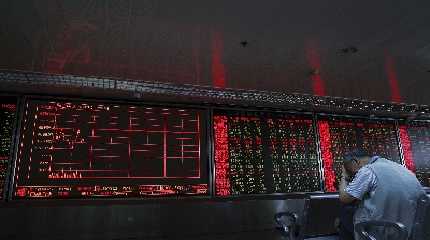
BANGKOK (AP) — Shares were mostly lower Tuesday in Asia as markets remained jittery over the outcome of a Communist Party congress in China, where key reformers were excluded from the highest ranks of ruling party leadership.
Hong Kong’s benchmark failed to hold onto early gains after a 6.4% selloff the day before that took it to its lowest close in over a decade. Tokyo and Sydney advanced but Shanghai, Seoul and Mumbai declined.
U.S. futures edged 0.1% higher but oil prices fall back.
The swooning of Chinese stocks followed the conclusion over the weekend of a Communist Party congress in Beijing where leader Xi Jinping gave himself an unprecedented third five-year term and installed key allies as top ruling party leaders, vanquishing officials viewed as pro-market reformers.
Xi wants a bigger Communist Party role in China’s business and technology development, raising fears centralized control will stunt an economy that already is slowing.
But that might not mean major policy changes, said Iris Pang of ING.
That’s because “most, if not all, existing policy decisions has been agreed with Xi. This applies to potential changes in the central bank governor, banking regulator and economic adviser.”
At a press briefing Tuesday, Hong Kong leader John Lee said his administration’s assessment showed market activities were running in an orderly way, though he urged investors to make careful decisions.
“Yes, volatility will be high, but our long-tested systems and response systems are in operation all the time. We have a strong response plan for different contingencies,” he said.
Hong Kong’s Hang Seng lost 0.2% to 15,151.01 and the Shanghai Composite index also shed earlier gains, slipping 0.1% to 2,975.08. Taiwan’s benchmark fell 1.5%.
Tokyo’s Nikkei 225 index rose 1.2% to 27,301.50 while the Kospi in Seoul lost 0.1%, to 2,235.07. Australia’s S&P/ASX 200 gained 0.3% to 6,798.60. India’s Sensex slipped 0.3%.
On Wall Street on Monday, stocks extended gains from last week as investors geared up for a heavy week of earnings from big technology companies.
The S&P 500 rose 1.2% to 3,797.34, with technology, health care and financial stocks accounting for a big share of the gains. Only materials and real estate sector stocks fell.
The Dow Jones Industrial Average rose 1.3% to 31,499.62, and the tech-heavy Nasdaq composite closed 0.9% higher, at 10,952.61.
Small company stocks also rose. The Russell 2000 index climbed 0.4% to 1,748.40.
Google’s parent company, along with Facebook’s parent, Amazon and Apple are all reporting their latest financial results this week. They are among the priciest stocks in the benchmark S&P 500 and their earnings this week could mean big moves, up or down, for the broader market.
Several big companies outside of the tech sector are also reporting earnings this week, including Coca-Cola, General Motors and Caterpillar.
Trading has been volatile this month, but the major indexes are solidly higher entering the last full week of October after a couple of big market rallies last week. The S&P 500 is up 5.9% so far this month, while the Dow is up 9.7%. The Nasdaq is up a more modest 3.6%.
Investors are closely reviewing the latest round of corporate earnings to get a better picture of inflation’s impact on different areas of the economy. Prices on everything from clothing to food remain at their highest levels in four decades. That has put pressure on companies to raise prices and cut costs, while squeezing consumers.
The Federal Reserve and central banks around the world have been raising interest rates to tame inflation and those increases have been weighing on pricier stocks, like technology companies, by making less-risky bonds seem more attractive in a volatile stock market.
The Fed is expected to raise interest rates another three-quarters of a percentage point at its upcoming meeting in November.
Economists and investors worry central banks could go too far in slowing economic activity, triggering a recession. They’re looking for any sign they might ease up on rate increases. The U.S. economy is already slowing down, contracting during the first half the year. The U.S. government will release its third-quarter gross domestic product report on Thursday.
In other trading, the dollar rose to 148.97 Japanese yen from 148.94 yen. The euro fell to 98.63 cents from 98.75 cents.
Benchmark U.S. crude oil was unchanged at $84.58 per barrel. Brent crude, the international pricing standard, shed 8 cents to $91.13 per barrel.




